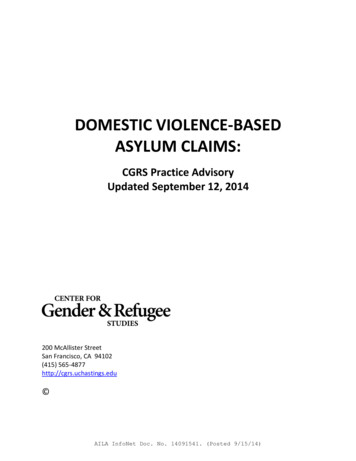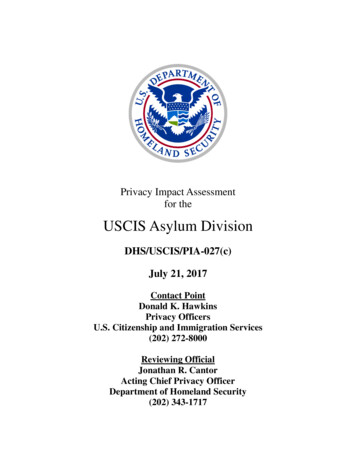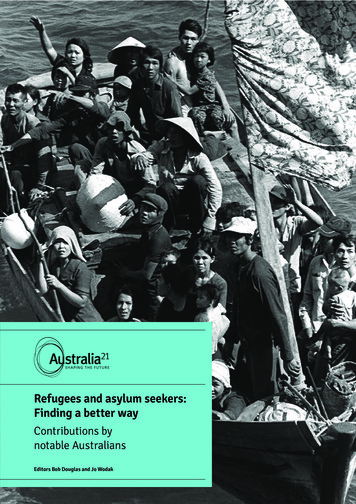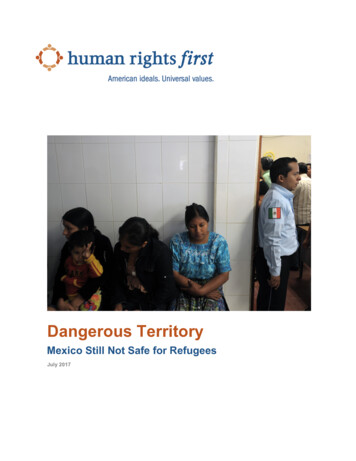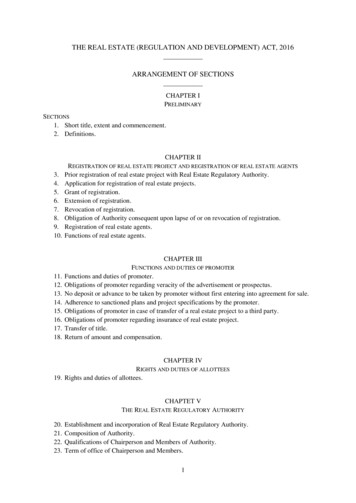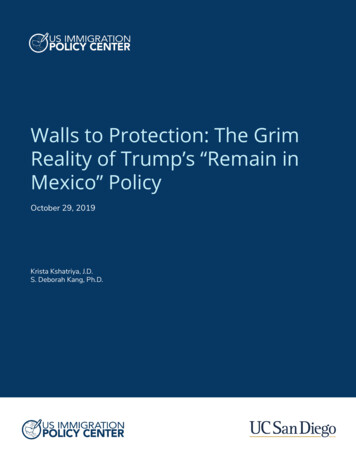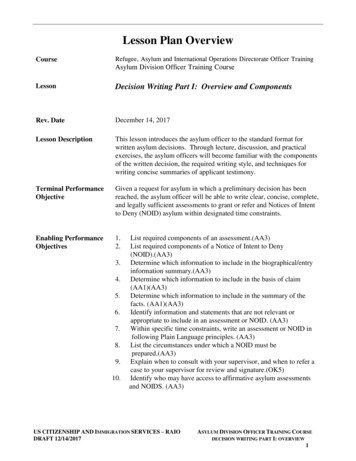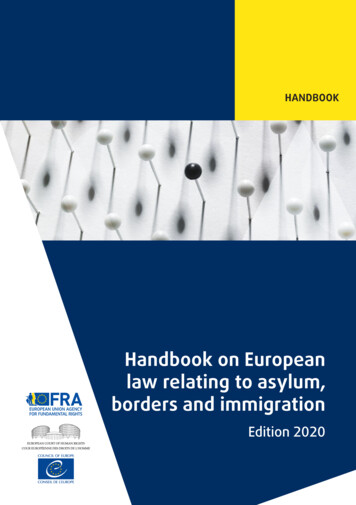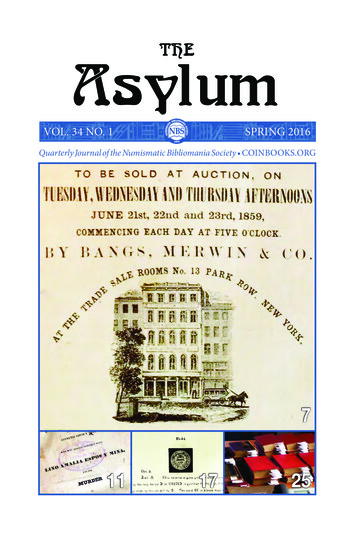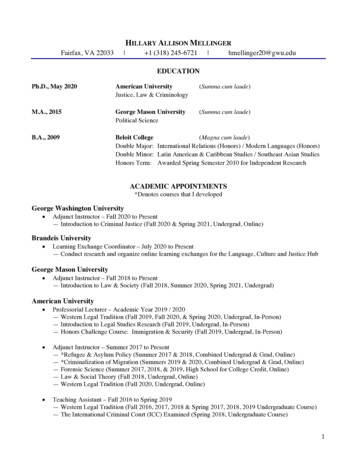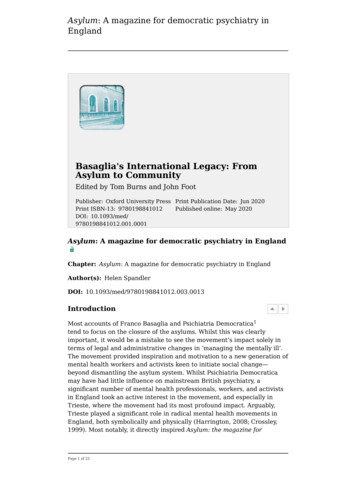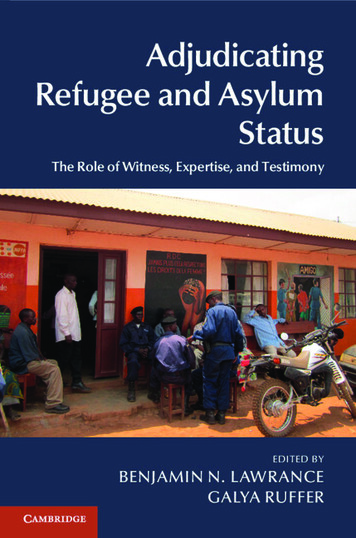
Transcription
adjudicating refugee and asylum statusIn this book, an array of legal, biomedical, psychosocial, and social sciencescholars and practitioners offer the first comparative account of the increasingdependence on expertise in the asylum and refugee status determination process.This volume presents a comprehensive study of the relevance of experts, asmediators of culture, who are called on to corroborate, substantiate credibility,and serve as translators in the face of confusing legal standards that require proof ofnew forms and reasons for persecution around the globe. The authors draw ontheir interactions with expertise and the immigration process to provide insightsinto the evidentiary burdens on asylum seekers and the expanding role of expertisein the forms of country-conditions reports, biomedical and psychiatric evaluations,and the emerging field of forensic linguistic analysis in response to emerging formsof persecution, such as gender-based or sexuality-based persecution. This book isessential reading for both scholars interested in the production of knowledge andclinicians considering the role of experts as mediators of asylum claims.Benjamin N. Lawrance is the Hon. Barber B. Conable, Jr., Endowed Chairin International Studies in the department of sociology and anthropology at theRochester Institute of Technology. He has published ten books, most notablyAmistad’s Orphans (2015) and Trafficking in Slavery’s Wake (2012). Lawrance is alegal consultant and has served as an expert witness for more than 250 West Africanasylum claims in fifteen countries. His research is situated at the dynamic interdisciplinary intersection of history, anthropology, and sociology and is focused oninternational mobilities, including migration, smuggling, trafficking, forced marriage, and refugee movements.Galya Ruffer is Director of International Studies and the founding director of theCenter for Forced Migration Studies housed at the Buffett Center for Internationaland Comparative Studies at Northwestern University. Her work centers on refugeerights and protection, regional understandings of the root causes of conflict andrefugee crises, and the rule of law and the process of international justice, with aparticular focus on the Great Lakes region of Africa. She serves on the executivecommittee for the International Association for the Study of Forced Migrationand is a vice chair of the American Bar Association International Refugee LawCommittee. Aside from her academic work, she has worked as an immigrationattorney representing political asylum claimants both as a solo practitioner and as apro bono attorney.
Adjudicating Refugeeand Asylum Statusthe role of witness, expertise,and testimonyEdited byBENJAMIN N. LAWRANCERochester Institute of TechnologyGALYA RUFFERNorthwestern University
32 Avenue of the Americas, New York, ny 10013-2473, usaCambridge University Press is part of the University of Cambridge.It furthers the University’s mission by disseminating knowledge in the pursuit ofeducation, learning, and research at the highest international levels of excellence.www.cambridge.orgInformation on this title: www.cambridge.org/9781107069060Ó Cambridge University Press 2015This publication is in copyright. Subject to statutory exceptionand to the provisions of relevant collective licensing agreements,no reproduction of any part may take place without the writtenpermission of Cambridge University Press.First published 2015Printed in the United States of AmericaA catalog record for this publication is available from the British Library.Library of Congress Cataloging in Publication DataAdjudicating refugee and asylum status : the role of witness, expertise, and testimony /edited by Benjamin N. Lawrance, Galya Ruffer.pages cmIncludes bibliographical references and index.isbn 978-1-107-06906-0 (hardback)1. Asylum, Right of. 2. Political refugees – Legal status, laws, etc. 3. Refugees –Legal status, laws, etc. 4. Evidence, Expert – European Unioncountries. 5. Asylum, Right of – Great Britain. I. Lawrance, Benjamin N.(Benjamin Nicholas) II. Ruffer, Galya.k3268.3.a93 2014261.8–dc202014027872isbn 978-1-107-06906-0 HardbackCambridge University Press has no responsibility for the persistence or accuracy ofurls for external or third-party Internet Web sites referred to in this publicationand does not guarantee that any content on such Web sites is, or will remain,accurate or appropriate.
Contentspage viiAbout the ContributorsxiiiAcknowledgmentsxvForeword: Jeffrey HerbstIntroduction: Witness to the Persecution? Expertise,Testimony, and Consistency in Asylum Adjudication1Benjamin N. Lawrance and Galya Rufferpart i: socio-cultural inconsistencyand the contours of expertise1Reconstructing Babel: Bridging Cultural Dissonancebetween Asylum Seekers and Adjudicators27Bruce J. Einhorn and S. Megan Berthold2Recovering the Sociological Identity of Asylum Seekers:Language Analysis for Determining National Origin in theEuropean Union54Noé Mahop Kam3Research and Testimony in the “Rape Capital of the World”:Experts and Evidence in Congolese Asylum Claims84Galya Ruffer4Beyond Expert Witnessing: Interdisciplinary Practicein Representing Rape Survivors in Asylum CasesMiriam H. Martonv102
vi5ContentsAnthropological Evidence and Country of OriginInformation in British Asylum Courts122Anthony Goodpart ii: practices and technologiesfor medico-psycho expertise6Expert as Aid and Impediment: Navigating Barriers toEffective Asylum Representation147Sabrineh Ardalan7Documenting Torture Sequelae: The Weill CornellModel for Forensic Evaluation, Capacity Building,and Medical Education166Khatiya Chelidze, Nicole Sirotin, Margaret Fabiszak,Terri Gallen Edersheim, Taryn Clark, Luis Villegas,Patriss Wais Moradi, and Joanne Ahola8Incredible Until Proven Credible: Mental Health ExpertTestimony and the Systemic and Cultural ChallengesFacing Asylum Applicants180Hawthorne Emery Smith, Stuart Lorin Lustig, and David Gangsei9Importing Forensic Biomedicine into AsylumAdjudication: Genetic Ancestry and Isotope Testingin the United Kingdom202Richard Tutton, Christine Hauskeller, and Steven Sturdy10“Health Tourism” or “Atrocious Barbarism”?Contextualizing Migrant Agency, Expertise,and Medical Humanitarian Practice221Benjamin N. LawranceAfterword: Lisa Dornell245Index253
About the ContributorsJoanne Ahola, MD, is board certified in psychiatry and on the voluntaryfaculty of the Weill Cornell Medical College. She maintains a private practicein general and psychodynamic psychiatry. She is Medical Director of theWeill Cornell Center for Human Rights. She has been a member of thevolunteer Asylum Network of Physicians for Human Rights (PHR) since2000. With PHR, she has trained health professionals around the countryin evaluating and documenting the psychological effects of torture andother forms of persecution. She has particular expertise in LGBT asylum,the one-year filing deadline, and testifying in court asylum hearings.Sabrineh Ardalan, JD, is Assistant Director and Lecturer on Law at theHarvard Immigration and Refugee Clinical Program. She previously served asthe Equal Justice America Fellow at The Opportunity Agenda and as alitigation associate at Dewey Ballantine LLP. She also clerked for the Hon.Michael A. Chagares of the Third Circuit Court of Appeals and the Hon.Raymond J. Dearie, Chief District Judge for the Eastern District of New York.She holds a JD from Harvard Law School and a BA in History andInternational Studies from Yale College.S. Megan Berthold, LCSW, PhD, is Assistant Professor at the Universityof Connecticut’s School of Social Work. A graduate of Harvard, Universityof Utah, and UCLA, she teaches casework and human rights. Since the mid1980s she has served as a clinician, forensic evaluator, and researcher with diverserefugees and asylum seekers in the United States and Asia, including with theProgram for Torture Victims in Los Angeles. She frequently testifies as an expertwitness in U.S. Immigration Court. Her areas of specialization include tortureand other traumas, mental health, and human rights. In 2009 the NationalAssociation of Social Workers named her Social Worker of the Year.vii
viiiAbout the ContributorsKhatiya Chelidze is an MD student at Weill Cornell Medical College. She isPublications Coordinator of the Weill Cornell Center for Human Rights. Shegraduated from Hunter College with a BA in Comparative Literature.Taryn Clark was an MD student at the Weill Cornell Medical College andone of the cofounders of the Weill Cornell Center for Human Rights.Lisa Dornell, JD, is a graduate of the University of Texas at Austin School ofLaw. She currently sits as an Administrative Judge with the Executive Officefor Immigration Review and presides over cases at the Immigration Court inBaltimore, Maryland.Terri Gallen Edersheim, MD, is Clinical Associate Professor of Obstetricsand Gynecology and Maternal Fetal Medicine at the Weill Cornell MedicalCollege, where she serves as Medical Director of the Weill Cornell Centerfor Human Rights. She is an AOA graduate of the Albert Einstein College ofMedicine, and she completed her residency training in Obstetrics andGynecology at The New York Hospital. She completed fellowship trainingin Maternal-Fetal Medicine before joining the faculty in 1986, where she haspracticed both on the full-time and voluntary faculties. She has participatedin the evaluation of torture victims seeking asylum with HealthRightInternational and Physicians for Human Rights.Bruce J. Einhorn, JD, is Executive Director and CEO of the AsylumProject, Of Counsel at Wolfsdorf Immigration Law Group, and AdjunctProfessor of Law at Pepperdine University. He was formerly Director of theAsylum and Refugee Law Clinic. Einhorn served as a Federal ImmigrationJudge for seventeen years until 2007. Previously, he served as a special prosecutor and as Chief of Litigation for the U.S. Department of Justice’s Office ofSpecial Investigations prosecuting fugitive Nazi war criminals. Einhornreceived his JD degree in 1978 from New York University Law School andhis BA degree, magna cum laude, from Columbia University in 1975, wherehe was selected for Phi Beta Kappa.Margaret Fabiszak is an MD/PhD candidate at the Weill Cornell/Rockefeller/Sloan Kettering Tri-Institutional MD/PhD Program and servesas the Research Coordinator at the Weill Cornell Center for Human Rights.David Gangsei, PhD, is a clinical psychology graduate of ColumbiaUniversity and licensed psychologist in California, specializing in providing
ixAbout the Contributorspsychological services to refugees, asylum seekers, and torture survivors. Heserved as Clinical Director of Survivors of Torture International, San Diego,where he oversaw the development of a program serving health, mentalhealth, case management, and asylum support services. He is a consultantdeveloping programs and training for organizations serving trauma victimsand survivors. Gangsei is an expert on forensic documentation of the psychological effects of torture and on recognition and management of vicarioustrauma for professionals and support personnel.Anthony Good, PhD, is Professor Emeritus in Social Anthropology at theUniversity of Edinburgh. His principal overseas field research sites are TamilNadu, South India, and Sri Lanka. He has served as an expert witness in morethan 600 asylum claims, mainly involving Sri Lankan Tamils. He conductedfact-finding visits to assess the human rights situation in Sri Lanka, producingreports for use as evidence in asylum appeal cases. He has conducted researchon expert evidence in British asylum courts. He has published numerousbooks and articles, including Anthropology and Expertise in the AsylumCourts (2007).Christine Hauskeller, PhD, is Senior Lecturer in the Department ofSociology and Philosophy at the University of Exeter. Her work combinescritical theory and empirical, hermeneutic research in studies on the interrelation between social institutions, individuals, knowledge formation, andthe role of biomedicine in social practices. The combination of conceptualand empirical work characterizes her approach and she has published widelyon Foucault and Butler, on torture, on stem cell ethics, and on genetics andidentity. She was Director of the U.K. Economics and Social ResearchCouncil–funded Centre for Genetics in Society in Exeter.Jeffrey Herbstis President of Colgate University.Noé Mahop Kam is a PhD candidate in the Department of PoliticalScience, Social and Communication Sciences at the Catholic University ofLouvain–la Neuve and Managing Director of Makano International, anAfrican-language analysis agency based in the Netherlands.Benjamin N. Lawrance, PhD, is the Hon. Barber B. Conable, Jr., EndowedProfessor of International Studies at Rochester Institute of Technology. He haspublished ten books, notably African Asylum at a Crossroads (2015), Amistad’sOrphans (2015), and Trafficking in Slavery’s Wake (2012). Lawrance is a legal
xAbout the Contributorsconsultant and has served as an expert witness on more than 250 occasions.Lawrance is the recipient of several national and international awards, including a fellowship from the National Endowment for the Humanities andfellowships at Yale, Harvard, and the University of California.Stuart Lorin Lustig, MD, MPH, is a child and adolescent psychiatristcurrently working for Cigna as a Lead Medical Director. He is AssociateClinical Professor of Psychiatry at the University of California San FranciscoSchool of Medicine and has extensive experience in forensic psychiatrypertaining to the political asylum process. He has collaborated with numeroushuman rights organizations on clinical and academic endeavors.Miriam H. Marton, JD, MSW, is Director of the Tulsa Immigrant ResourceNetwork, a post-graduate fellowship program at the University of Tulsa LawSchool, and assistant visiting clinical professor. Formerly she was the WilliamR. Davis Clinical Teaching Fellow in the Asylum and Human Rights Clinic atthe University of Connecticut School of Law. A practicing attorney since 2001,Marton worked for Skadden, Arps, Slate, Meagher & Flom LLP as lead attorneyin the representation of asylum applicants as part of Skadden’s pro bono program.She holds a JD from Michigan State University College of Law and an MSWfrom the University of Michigan School of Social Work. Marton had a fourteenyear career as a clinical social worker before pursuing her interest in the law.Galya Ruffer, JD, PhD, is Director of International Studies andthe founding Director of the Center for Forced Migration Studies housedat the Buffett Center for International and Comparative Studies atNorthwestern University. Her work centers on refugee rights and protection,regional understandings of the root causes of conflict and refugee crises,rule of law, and the process of international justice. She serves on theExecutive Committee for the International Association for the Study ofForced Migration and is Vice Chair of the American Bar AssociationInternational Refugee Law Committee.Nicole Sirotin, MD, is a general internist and served as Assistant Professorin the Department of Medicine at the Weill Cornell Medical College and amedical director of the Weill Cornell Center for Human Rights. She hasbeen conducting medical evaluations for asylum seekers since 2008. She hasa particular interest in education and in teaching medical trainees about thehealth issues of survivors of torture and in the health issues of recentlyarrived female immigrants. She serves as a volunteer for both Physicians
xiAbout the Contributorsfor Human Rights Asylum Network and the HealthRight Internationalvolunteer network.Hawthorne Emery Smith, PhD, is a licensed psychologist and the ClinicalDirector of the Bellevue/NYU Program for Survivors of Torture. He is also anAssistant Clinical Professor at the NYU School of Medicine. Smith receivedhis doctorate in Counseling Psychology (with distinction) from TeachersCollege, Columbia University. Smith has also earned a Bachelor of Sciencein Foreign Service from the Georgetown University School of ForeignService; an advanced certificate in African Studies from Cheikh Anta DiopUniversity in Dakar, Senegal; and a Master’s in International Affairs from theColumbia University School of International and Public Affairs.Steven Sturdy, PhD, is Professor of the Sociology of Medical Knowledge;Head of Science, Technology and Innovation Studies; and Wellcome TrustSenior Investigator in Medical Humanities at the School of Social andPolitical Sciences, University of Edinburgh. He has published numerousarticles about how developments in medical science have informed andbeen informed by wider changes in medical practice and medical policy.His current research examines the scientific, technological, social, and political processes that have led, over the past forty years or so, to the currentferment of activity around “genomic medicine.”Richard Tutton, PhD, is Senior Lecturer in the Department of Sociology atLancaster University. His work examines the social implications of humangenetics research, in areas ranging from health and citizenship, biobankingand human tissue collection, enhancement and biomedicalization, and identity formation in the context of genetic knowledge.Luis Villegasis an MD student at Weill Cornell Medical College.Patriss Wais Moradi is Clinical Researcher, Weill Cornell Centerfor Human Rights at Weill Cornell Medical College, and a graduate of theUniversity of California, Davis.
AcknowledgmentsAs is always the case, an edited volume is much more than the sum of itsparts. The editors and authors whose chapters appear in this volume areindebted to the colleagues who shared thoughts and ideas during the SecondConable Conference in International Studies, entitled “Refugees, Asylum Law,and Expert Testimony: The Construction of Africa and the Global South inComparative Perspective,” in Rochester, New York, in April 2011. The authorswould also like to thank the reviewers whose insights, we hope, strengthened thetext. Thanks also go to John Berger and David Jou at Cambridge; DevasenaVedamurthi at Integra Software Services, who so smoothly guided this projecttoward completion; and Meridith Murray for the index.Galya Ruffer appreciates the research support of the Dispute ResolutionResearch Center at Northwestern University and owes much thanks to herfamily, Jim, Ari, Jonah, Eli and Sheli, who wait endlessly for her to have awork-free weekend.Benjamin N. Lawrance would like to thank the several organizationsand entities that made the conference possible, namely, the ConableEndowment for International Studies, the Starr Foundation, the Program inInternational and Global Studies in the Department of Sociology andAnthropology in the College of Liberal Arts at Rochester Institute ofTechnology, the Weill Cornell Center for Human Rights, and theDepartment of History at Cornell University. He would also like to thank hisfamily, especially Wilson Silva.We both thank the various individuals whose contributions ultimately allfeature in this final product, including Peter Agree, Penny Andrews, IrisBerger, Judi Byfield, Taryn Clark, Evan Criddle, Susan Dicklitch, TashaFain, Paul Finkelman, Barbara Harrell-Bond, Jeffrey Herbst, Tobias Kelly,Christine Kray, Sue Long, Katherine Luongo, Mary Meg McCarthy, AndreaMcIntosh, Karen Musalo, Juan Osuna, Tricia Redeker Hepner, Cassandraxiii
xivAcknowledgmentsShellman, Meredith Terretta, Robert Ulin, James Winebrake, and the morethan 100 participants in the conference.When we first began serving as expert witnesses for asylum claims, we hadno sense of the unspeakable ordeals people are prepared to endure to survive.Jean-Francois Lyotard described the burden-facing asylum seekers as an“ethical tort,” an extreme form of injustice insofar as the victim is deprivedof means to speak about or prove their persecution. With this book, we are alittle closer to some sense of understanding, but there is still much work to bedone. We hope this book fosters conversations, activism, and critical scholarship. We offer this book as a vehicle to encourage others to embrace what maybe an unrecognized capacity and share their expertise. We are in awe of eachand every one of the hundreds of lives we have encountered during our expertwitnessing.We dedicate this book to the refugees and asylum seekers who routinelydisplay profound and unfathomable courage as they are asked by adjudicatorsto present their case and recount the brutalities and torture they have suffered,even as they are judged in languages and idioms they do not understand.noteAll possible effort has been made to protect the identity and confidentialityof the individuals whose life stories form part of this book. The authors ofchapters employ anonymous or pseudonymous monikers consistent with theirrespective discipline(s) where appropriate. Details, including but not limitedto race, ethnicity, and national origin, have been changed where necessaryand appropriate.
ForewordAdjudicating Refugee and Asylum Status is an important collection of essaysexamining how Western countries have come to use experts while evaluatingrefugee claims. This book, based on work by an enviable array of scholars andpractitioners, provides information on both the mechanics of refugee adjudication and how courts and legal forums have moved in a variety of perhapsunpredictable ways to use the work of experts in deciding whether to grantsanctuary to those with refugee claims. Accordingly, it is also an explicit andextended meditation on how knowledge developed and deployed by Westernexperts is used to evaluate the particular circumstances of people from poorregions of the world whose lives will be fundamentally altered depending onthe ultimate decision about their refugee status. In the settings examined bythe authors, knowledge is not retained for contemplation by those in the “ivorytower” but is used to make what may often literally be life-or-death decisions.The essays also hint at some of the paradoxes of globalization. In the twentyfirst-century world, knowledge, as well as data, money, and media, flow acrossnational boundaries with unprecedented ease. However, the flow of peopleacross boundaries has perhaps never been more regulated. In sub-SaharanAfrica, the continental home of many refugee crises over the centuries, acommon response to unhappiness or crises was for individuals or wholecommunities to move. It was only in the twentieth century – with the creationof national boundaries developed by the colonialists and subsequently ratifiedby independence leaders and the ensuing development of notions of citizenship tied to politically defined boundaries – that the concept of “refugee”was even possible. There seems to be every indication that the movement ofpeople will continue to be closely regulated by all nations and those, especiallyin the West, who have some ability to police their borders will continue to tryto control population movements through administrative mechanisms.xv
xviForewordAt the same time, because knowledge generally flows irrespective ofborders, we know, or think that we know, more about the world than everbefore. Partially as a result, refugee adjudication relies increasingly on theknowledge that in many cases we have or think that we possess. Yet, reflection,as found in this volume, suggests that the knowledge that we think we have isinevitably complex and sometimes problematic, especially given what is atstake for individuals.It is likely that the tension between ever-greater regulation of populationmovements and the desire to adjudicate individual cases through expertknowledge will only increase in the future. There are, as this book makesclear, no easy answers, although there are many important proposals in theindividual chapters that should be considered. More generally, a profoundunderstanding of how countries have arrived at their particular reliance onexpert knowledge will hopefully allow us to develop in the future systemsthat are fairer, more transparent, and appropriate, given the consequencesof particular decisions. The individual contributions in this book and theintellectual project that the authors collectively contribute to are thereforeimportant and timely and should be appreciated by both other scholars andthose practicing in this very difficult area.Jeffrey HerbstPresident, Colgate University
Introduction: Witness to the Persecution? Expertise,Testimony, and Consistency in Asylum AdjudicationBenjamin N. Lawrance and Galya RufferThe narratives of refugees and asylum seekers are routinely subjected toscrutiny in a variety of Western jurisdictions, ranging from the administrativecourts in the United States and the immigration review board of Canada, tothe multiple levels of review in diverse European jurisdictions. Historically,the refugee and asylum adjudication process (henceforth RSD) has beeninternal, domestic, and more often than not, behind closed doors and notsubject to appeal. From the 1980s, however, many legislatures reformedadministrative law systems to reflect greater accountability and domesticimmigration laws and asylum review procedures were targeted for particularamendment (Alexander 1999). The legacy of these legislative reforms is nowbecoming apparent throughout North America, Europe, and Australasia. Justas the asylum and refugee adjudication process has become more transparent,denial and deportation rates have risen (Ramji-Nogales et al. 2009). Over thepast decade, judges and adjudicators have sought to insulate their decisionmaking by demonstrating sensitivity to evidence and narrative by incorporating external expertise. Adjudicating Refugee and Asylum Status explores theincreasing evidentiary burdens on asylum seekers and expanding role of avariety of forms of expertise – ranging from country conditions reports, tobiomedical and psychiatric evaluations, to the emerging field of forensiclinguistic analysis – in refugee decision making.In its 1979 Handbook and Guidelines on Procedures and Criteria forDetermining Refugee Status (UNHCR Guidelines), the UNHCR stated thatwhile “the burden of proof lies on the person submitting a claim,” it is oftenthe case that “a person fleeing from persecution will have arrived with thebarest necessities and very frequently even without personal documents.”Therefore, the UNHCR observed, the “duty to ascertain and evaluate all therelevant facts” is shared “between the applicant and the examiner.” Thehandbook further noted that the “requirement of evidence should thus not1
2Benjamin N. Lawrance and Galya Rufferbe too strictly applied in view of the difficulty of proof inherent in the specialsituation in which an applicant for refugee status finds” him or herself. Instead,an applicant’s fear of persecution should be considered well-founded if he orshe “can establish, to a reasonable degree,” that his or her “continued stay” inthe respective “country of origin has become intolerable.” The 2011 reissue ofthe Handbook reaffirmed these guidelines, and common law countries havegenerally supported the view that there is no requirement to prove wellfoundedness conclusively beyond doubt, or even that persecution is moreprobable than not. To establish “well-foundedness,” persecution must beproved to be reasonably possible (UNHCR 1998).Notwithstanding this lower threshold, according to Peter Showler, theformer Chair of the Canadian Immigration and Review Board, decidingrefugee claims is the single most complex adjudication function in Westernsocieties (Rousseau et al. 2002, p. 43). To be a refugee and obtain asylum, anasylum seeker must prove that she is unable or unwilling to return to hercountry of origin either because she has suffered persecution in the past orbecause she has a “well-founded fear” of future persecution. The asylumseeker must also prove that her persecutor targeted her on account of at leastone of five protected grounds: race, religion, nationality, political opinion, ormembership in a particular social group. Whereas in most criminal and civilprocedures adjudicators are able to access a range of concrete evidence,asylum cases are marked by a general lack of factual, verifiable evidence(CREDO 2013, p. 11).The central piece of evidence in an asylum case is the applicant’s testimony,in written and/or oral form, where he or she narrates all the informationrelevant to her/his case. The case, therefore, hinges on whether the adjudicator deems the applicant’s testimony to be credible. Documenting the situationin the country of origin, including general social and political conditions, thehuman rights situation and record, relevant legislation and application oflaw, the persecuting agent’s politics or practices, and particular policies,practices, or attitudes towards persons who are in similar situations as theapplicant, are especially important for assessing an individual’s credibility(Cohen 2001; Millbank 2009; UNHCR 2013; CREDO 2013). In addition tocountry of origin information (COI), experts are increasingly called upon tolend credibility and corroborate the applicant’s testimony of both events thatoccurred in the past (past persecution) and the risk that they will occur in thefuture should the applicant be returned to his or her country of origin (wellfounded fear of future persecution). In evaluating the risk of persecution,bureaucrats, tribunals, and courts take into account the personal circumstances of the applicant such as his/her background, experiences, personality,
3Witness to the Persecution?and other personal factors that could expose him/her to persecution.Particularly relevant is whether the applicant has previously suffered persecution or other forms of mistreatment and the experiences of relatives andfriends, persons in the same situation.There is little international guidance on the role
refugee crises, and the rule of law and the process of international justice, with a particular focus on the Great Lakes region of Africa. She serves on the executive committee for the International Association for the Study of Forced Migration and is a vice chair of the American Bar Association International Refugee Law Committee.
